Environmental Studies prepares students with knowledge, skills, and ethical sensibilities needed to engage a broad range of local-to-global human-environment relationships.
Environmental Studies prepares students with knowledge, skills, and ethical sensibilities needed to engage a broad range of local-to-global human-environment relationships. The program centers interdisciplinarity, cross-cultural perspectives, and care with the goal of better understanding the human and more-than-human world. The curriculum includes courses in the natural sciences, social sciences, and humanities that encourage students to explore the scientific, technical, social, political, economic, cultural, aesthetic, historical, ethical, and justice-oriented aspects of environmental inquiry. Students approach questions in the major by developing more focused knowledge and methodological tools in their major concentration. At a time of radical climatic and environmental change, we aim to empower students to create a more just, livable, and compassionate world for human and more-than-human flourishing.
Courses
The curriculum includes interdisciplinary coursework that encourages students to explore the scientific, technical, political, historical, cultural, and justice-oriented aspects of environmental issues.
Faculty
Professors within Environmental Studies and across the campus offer courses and conduct research that span the natural sciences, social sciences, and humanities.
Community Engagement
From internships to community-engaged coursework and research, the ES Program offers connections and experiences beyond the Bates environment.
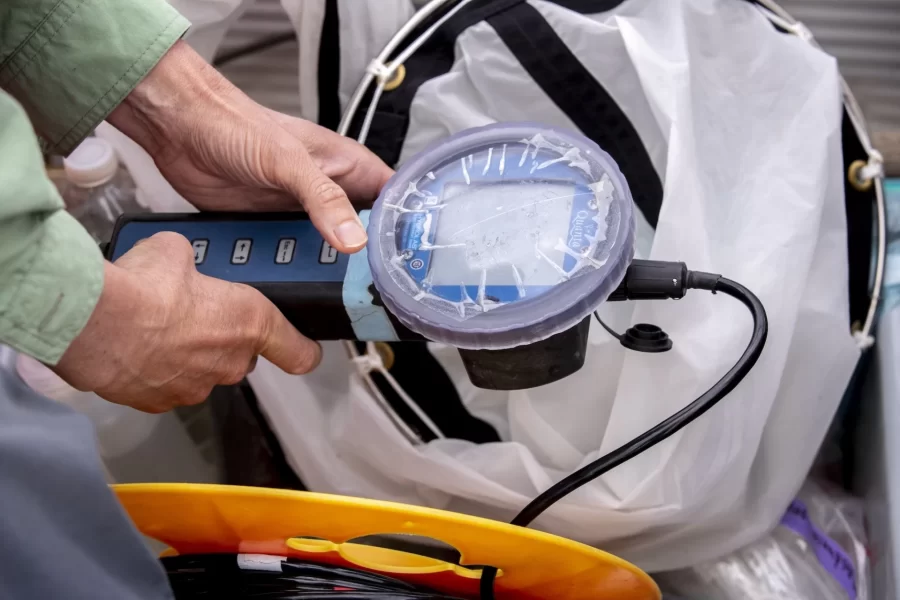
Supervised by Holly Ewing, Christian A. Johnson Professor of Interdisciplinary Studies, environmental studies major Christopher Castaneda ’20 takes water samples from Lake Auburn. He’s studying nutrients produced by algae and consumed by other organisms in the lake. Related to the impacts of algae blooms on water quality, the research supports community efforts to deliver unfiltered public water at the lowest price.
On the boat with
Water treatment manager and lab director Chris Curtis (in blue shirt) and Lindsay Bates and Dan Fortin, water quality technicians (Bruins sweatshirt)
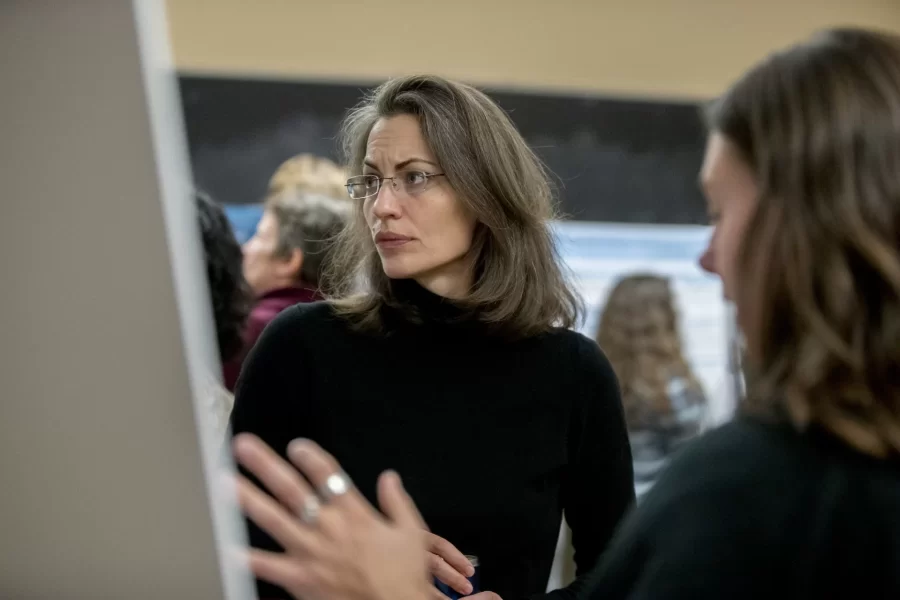
The environmental studies department holds a research poster session in Hedge Hall during the final week of classes. Jane Costlow attends.
Sonja K. Pieck
Associate Professor of Environmental Studies
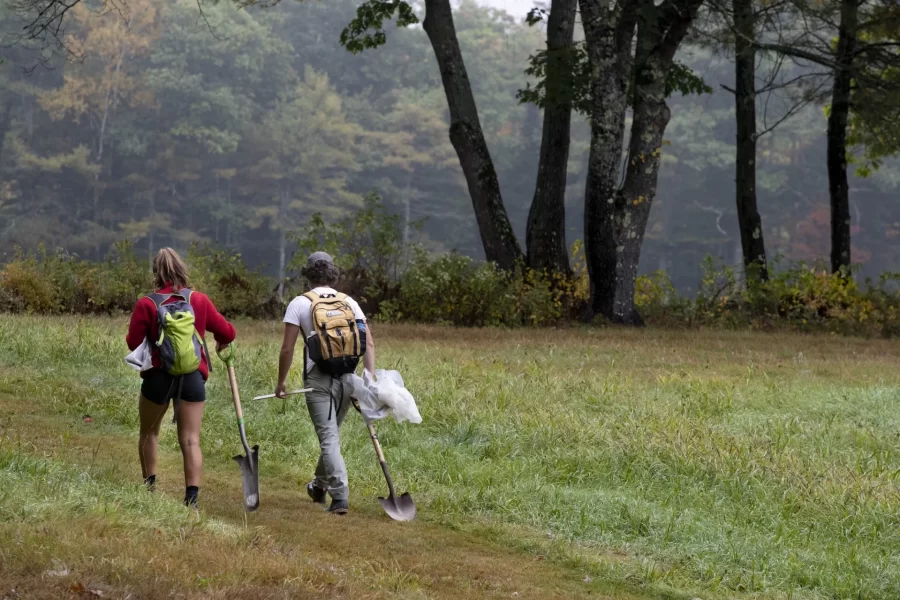
Zoe Knauss ’23 of Buffalo, N.Y., who will declare as an ES major, and ES major Sam Gilman ’22 of Mendham, N.J., , dig for soil in a field.
Prof of Environmental Studies and Christian A. Johnson Prof of Interdisc Studies Holly Ewing and Lecturer in Environmental Studies & Learning Associate in Environmental Studies Camille Parrish take students in the Soils/Lab course for a field trip to Pettengill Farm in Freeport, Maine. A nineteenth century salt-water farm on the estuary of the Harraseeket River, the farm is owned by Freeport Historical Society(FHS). It includes a saltbox house (ca. 1800) on 140 acres of fields, woods, antique apple orchards and salt marsh. Most interesting are the etchings (sgraffitti) found on the plaster walls in the upper chambers of ships, sea monsters, longboats and animals. The farmhouse remains without plumbing, central heat and electricity and is listed in the National Register of Historic Places. Mildred Pettengill was its last resident and lived in the house until 1970.
The students are digging up soil and making observations (soil profiles) before putting it back where it came from.
ENVR 310 – Soils/Lab
Depending on one’s point of view, soils are geological units, ecosystems, the foundation of plant life, a place for microbes to live, building material, or just dirt. This course takes a scientific perspective and explores the genesis of soils, their distribution and characteristics, and their interaction with plants. Field studies emphasize description of soils, inferences about soil formation, and placement within a landscape context. Labs investigate the chemistry of soils and their role in forestry and agriculture.
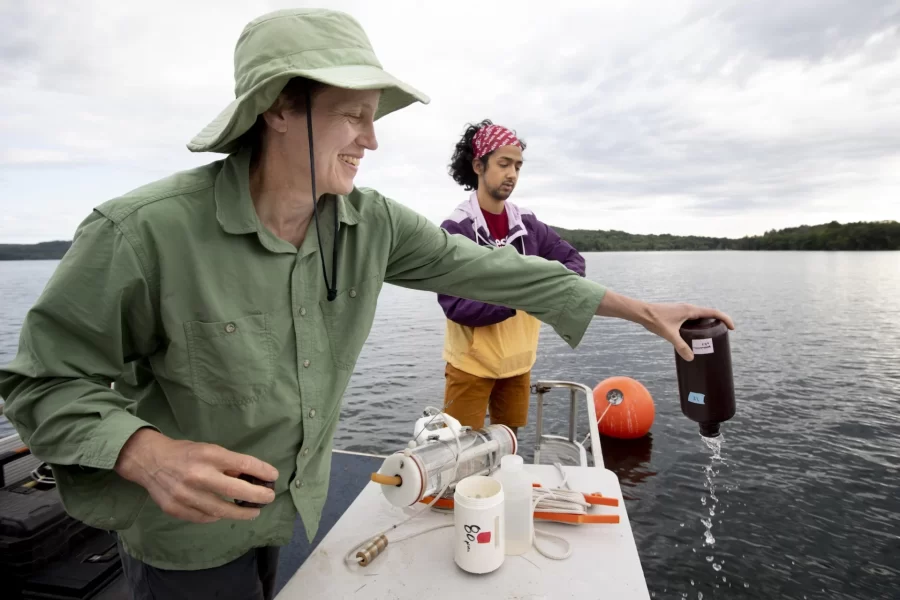
Supervised by Holly Ewing, Christian A. Johnson Professor of Interdisciplinary Studies, environmental studies major Christopher Castaneda ’20 takes water samples from Lake Auburn. He’s studying nutrients produced by algae and consumed by other organisms in the lake. Related to the impacts of algae blooms on water quality, the research supports community efforts to deliver unfiltered public water at the lowest price.
On the boat with
Water treatment manager and lab director Chris Curtis (in blue shirt) and Lindsay Bates and Dan Fortin, water quality technicians (Bruins sweatshirt)
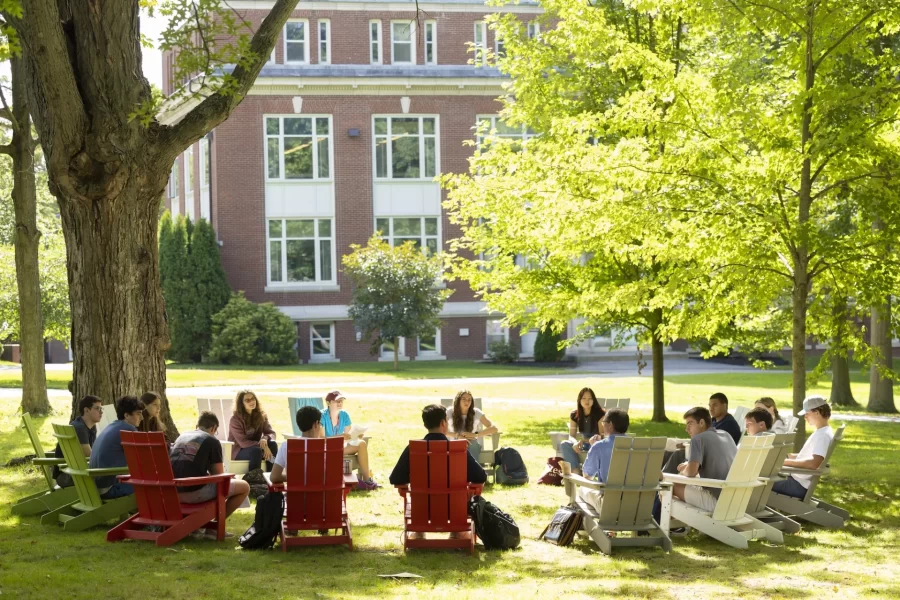
“It was a great day to be talking under the trees.”
— Associate Professor of History Joe Hall, describing the first meeting of his first-year seminar, “This Land is Whose Land?” on the Historic Quad.
The class, along with all other first-year seminars, met for the first time on Thursday morning, Sept. 1, 2022, as an opportunity for classmates to connect with each other and their instructor, who will also serve as their first-year advisor.
Swipe left for a few additional moments from yesterday’s first-year seminars, including:
“Beyond Nelson Mandela: Themes and Personalities in South African History,” taught by Assistant Professor of History Patrick Otim;
“Arts and Spirituality: Art Making and Aesthetic Experience as Conduits for Reflection and Connection,” taught by Lecturer in the Humanities and Multifaith Chaplain Brittany Longsdorf; and
“Reading Refugees and Migration in European Children’s Literature,” taught by Associate Professor of German Raluca Cernahoschi.
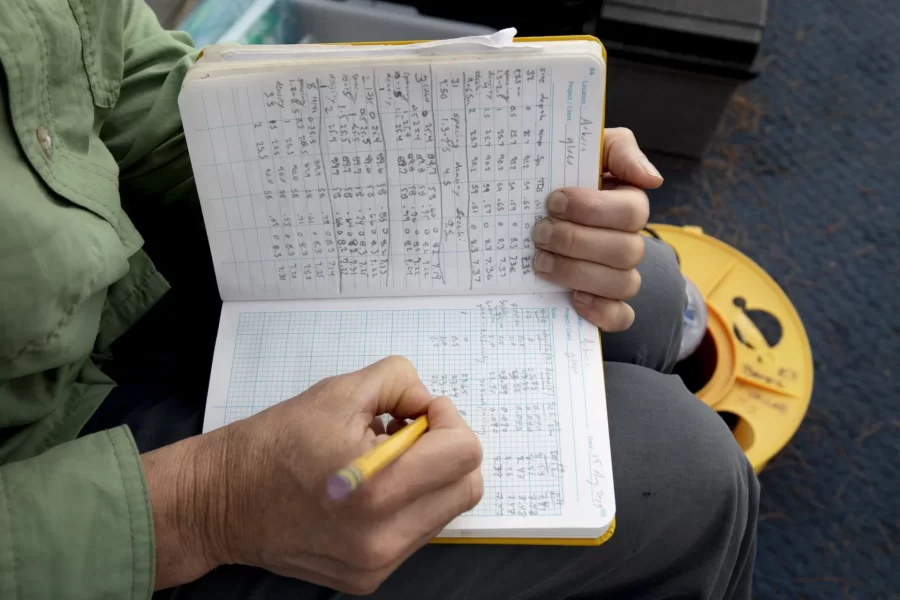
Supervised by Holly Ewing, Christian A. Johnson Professor of Interdisciplinary Studies, environmental studies major Christopher Castaneda ’20 takes water samples from Lake Auburn. He’s studying nutrients produced by algae and consumed by other organisms in the lake. Related to the impacts of algae blooms on water quality, the research supports community efforts to deliver unfiltered public water at the lowest price.
On the boat with
Water treatment manager and lab director Chris Curtis (in blue shirt) and Lindsay Bates and Dan Fortin, water quality technicians (Bruins sweatshirt)
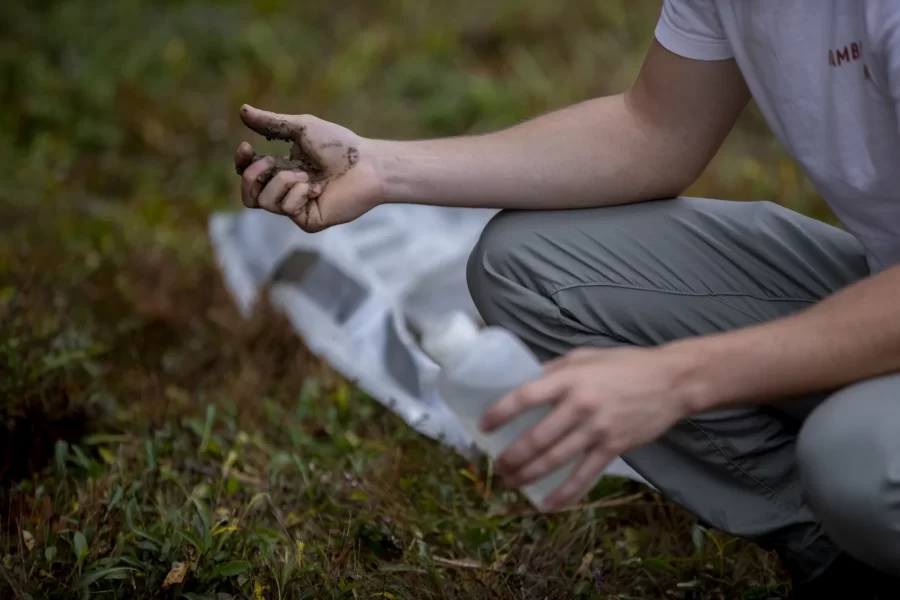
Zoe Knauss ’23 of Buffalo, N.Y., who will declare as an ES major, and ES major Sam Gilman ’22 of Mendham, N.J., , dig for soil in a field.
Prof of Environmental Studies and Christian A. Johnson Prof of Interdisc Studies Holly Ewing and Lecturer in Environmental Studies & Learning Associate in Environmental Studies Camille Parrish take students in the Soils/Lab course for a field trip to Pettengill Farm in Freeport, Maine. A nineteenth century salt-water farm on the estuary of the Harraseeket River, the farm is owned by Freeport Historical Society(FHS). It includes a saltbox house (ca. 1800) on 140 acres of fields, woods, antique apple orchards and salt marsh. Most interesting are the etchings (sgraffitti) found on the plaster walls in the upper chambers of ships, sea monsters, longboats and animals. The farmhouse remains without plumbing, central heat and electricity and is listed in the National Register of Historic Places. Mildred Pettengill was its last resident and lived in the house until 1970.
The students are digging up soil and making observations (soil profiles) before putting it back where it came from.
ENVR 310 – Soils/Lab
Depending on one’s point of view, soils are geological units, ecosystems, the foundation of plant life, a place for microbes to live, building material, or just dirt. This course takes a scientific perspective and explores the genesis of soils, their distribution and characteristics, and their interaction with plants. Field studies emphasize description of soils, inferences about soil formation, and placement within a landscape context. Labs investigate the chemistry of soils and their role in forestry and agriculture.






